#economy
Text
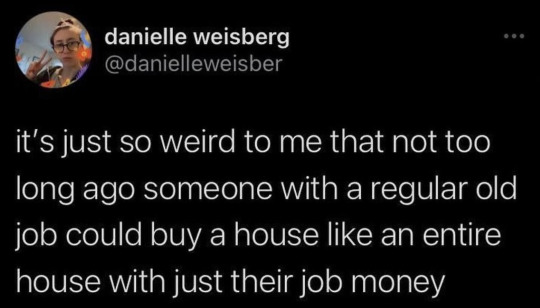
594 notes
·
View notes
Text
#detroid become human#sherlock holmes#mw2#crystals#abstract#dream smp fanart#economy#jenna lynn meowri#full moon#bunnies#DMT#beautiful quote#slashers x reader#bieber
125 notes
·
View notes
Text
#dream smp fanart#economy#bunnies#DMT#beautiful quote#slashers x reader#bieber#latin girls#gus porter#vanessa hudgens#los angeles lakers#effy stonem
121 notes
·
View notes
Text
#detroid become human#maconha#psychology#crystals#abstract#brownies#dream smp fanart#curvy body#economy#jenna lynn meowri#full moon
121 notes
·
View notes
Text
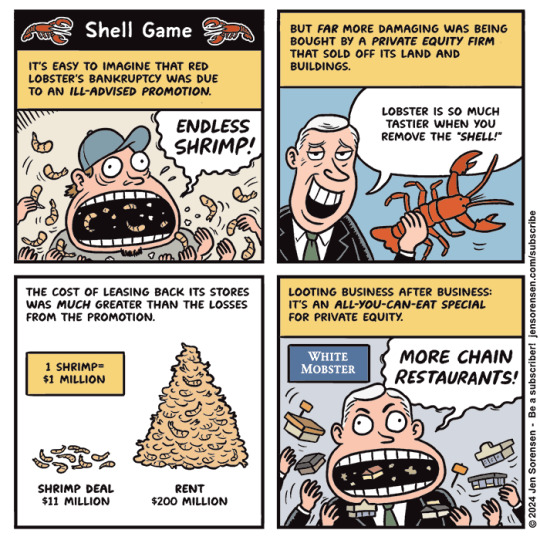
The Looting of Red Lobster
I had to keep things simple for the cartoon, but you can learn more about what happened to Red Lobster from this excellent article by Gretchen Morgenson.
Receive my weekly newsletter and keep this work sustainable by joining the Sorensen Subscription Service! Also on Patreon.
42 notes
·
View notes
Text


To become what we need to each other, and to find power in friendship, is to become dangerous.
—anonymous[41]
I have a circle of friends and family with whom I am radically vulnerable and trust deeply—we call it coevolution through friendship.
—adrienne maree brown[42]
The urgency of making kin[43]
Empire works in part by constantly attenuating and poisoning relationships. Kinship has been enclosed within the nuclear family, freedom within the individual, and values within morality. Together, these enclosures sap relationships of their intensity and their transformative potential. If relationships are what compose the world and our lives, then the “free individual” of modern, Western capitalism (an implicitly straight, white, able-bodied, cis-gendered, property-owning man) is a sad and lonely vision: a strange fiction invented by a violent and fearful society, walled in by morality and self-interest. This is an uprooted being who sees his rootlessness—his very incapacity to make and sustain transformative connections—as a feat of excellence.
We suggest that Empire’s grip on relationships is being broken by new and resurgent forms of intimacy through which people come to depend on each other, defend each other, and become dangerous together. Friendship as freedom, in this story, names interdependent relationships as a source of collective power, a dangerous closeness that Empire works to eradicate through relentless violence, division, competition, management, and incitements to see ourselves as isolated individuals or nuclear family units.
Spinoza helps us dissolve the fiction of the modern Western individual—and its oscillation between self-interest and morality—into a relational ethics. A lot of people already navigate their everyday lives in this way, attuned and responsive to their own situations and relationships. Along these lines, we draw on a minor current of anarchism associated with Gustav Landauer and others that centers relationships as the basis of resistance and movement. We bring these currents into conversation with Indigenous worldviews and practices, along with the ethical questions that are being asked and answered in a multiplicity of ways, in different places, around decolonizing relationships between settlers and Indigenous people. This conversation always includes questions of how to sever harmful relationships. Freedom, in this sense, is not just the capacity to generate “good” relationships, but also to draw lines in the sand and fight.
#joy#anarchism#joyful militancy#resistance#community building#practical anarchy#practical anarchism#anarchist society#practical#revolution#daily posts#communism#anti capitalist#anti capitalism#late stage capitalism#organization#grassroots#grass roots#anarchists#libraries#leftism#social issues#economy#economics#climate change#climate crisis#climate#ecology#anarchy works#environmentalism
21 notes
·
View notes
Text
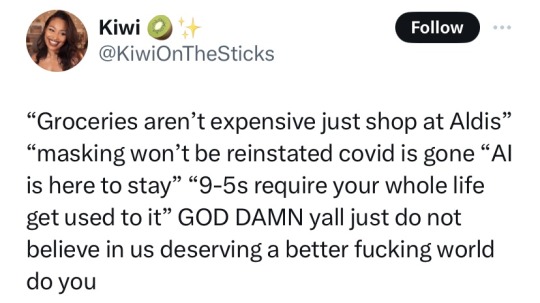
60K notes
·
View notes
Text
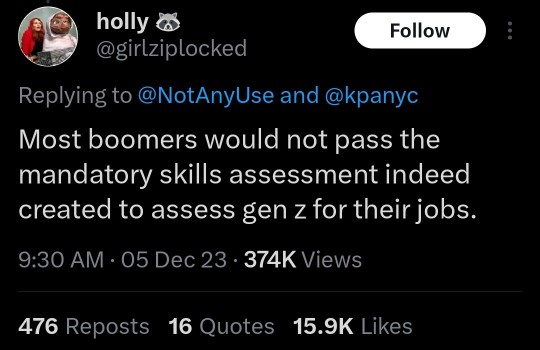
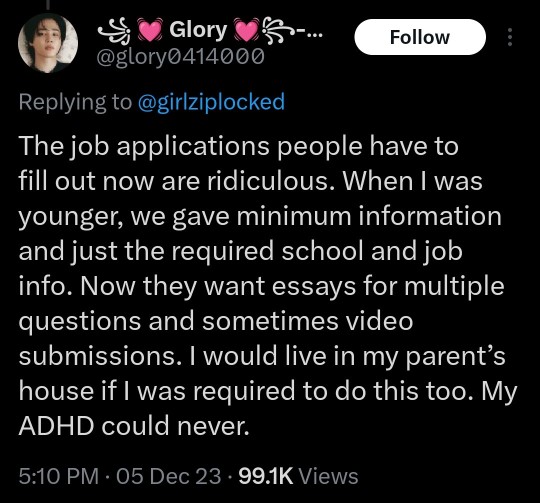
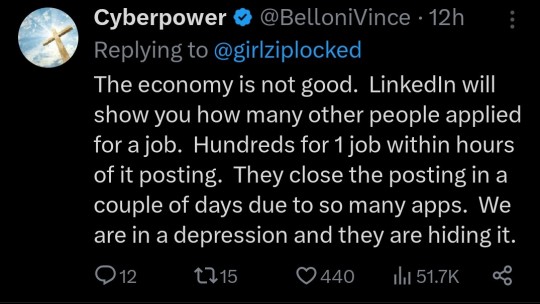

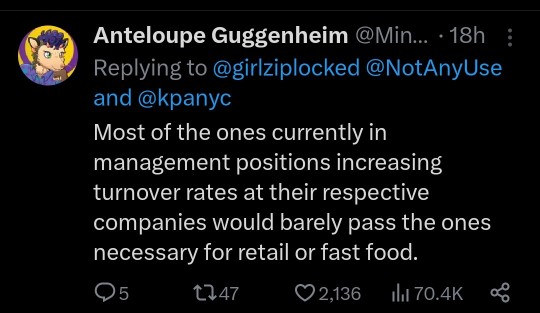
68K notes
·
View notes
Text
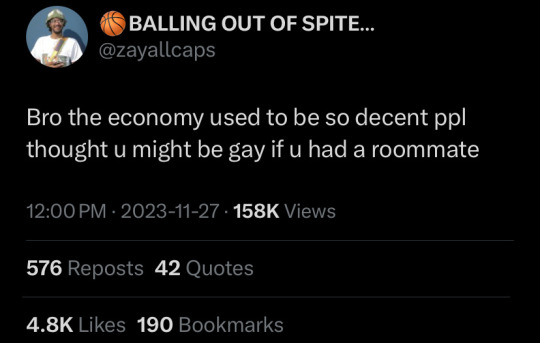
#lgbt#lgbtq#lgbtqia#economics#economy#capitalism#politics#twitter#tweets#tweet#meme#memes#funny#lol#humor
72K notes
·
View notes
Text
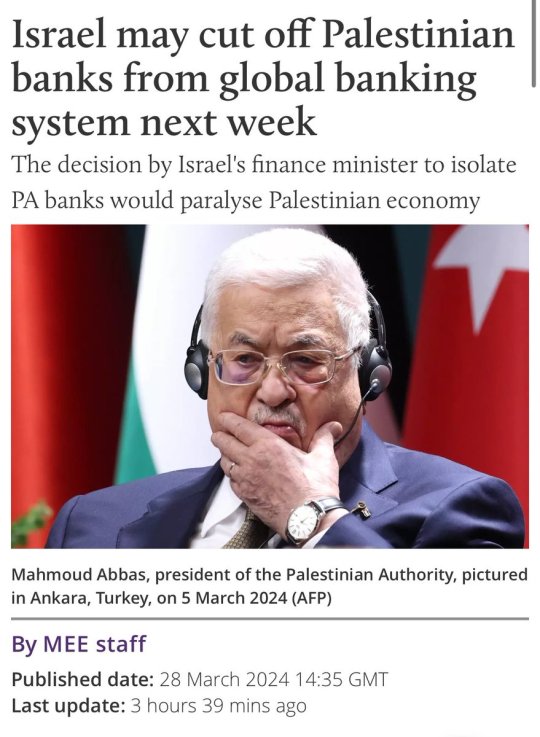
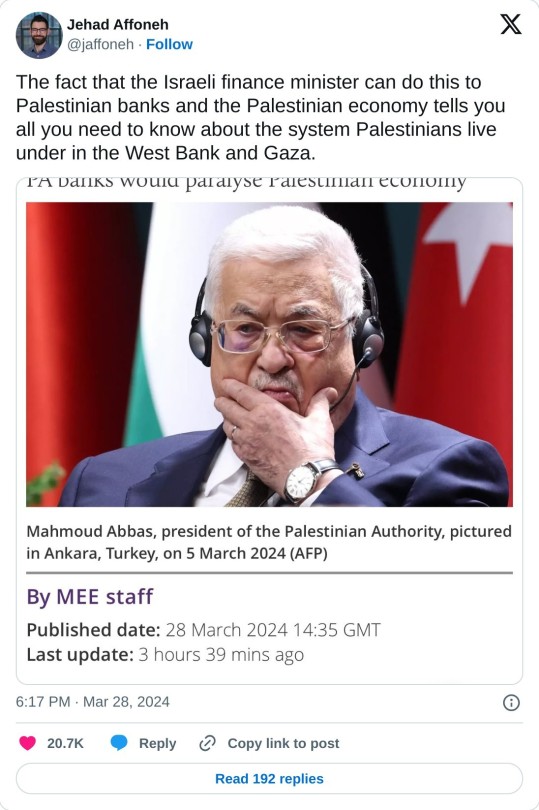
Palestinian banks could be cut off from the Israeli banking system starting next week following a decision by Israel’s finance minister to cease dealings between the two financial institutions, according to a report on Thursday by Israeli newspaper Haaretz.
Israeli Prime Minister Benjamin Netanyahu has two days to convene a cabinet meeting to discuss reversing plans by Finance Minister Bezalel Smotrich to isolate Palestinian banks from both the Israeli and international banking systems.
The Palestinian economy is based on the Israeli currency, the shekel, making it reliant on ties to Israel and its financial dealings with the rest of the world must go through the Bank of Israel and Israeli banks.
We call this Apartheid.
#yemen#jerusalem#tel aviv#current events#palestine#free palestine#gaza#free gaza#news on gaza#palestine news#news update#war news#war on gaza#apartheid#end the occupation#end the apartheid#economy
26K notes
·
View notes
Text
329 notes
·
View notes
Text
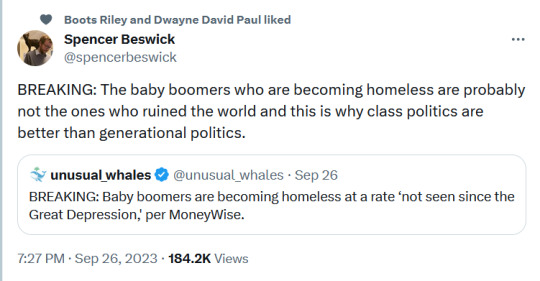
#twitter#tweet#tweets#boomers#economics#economy#homeless#class politics#generational politics#class#inequality#wealth inequality
51K notes
·
View notes
Text

20K notes
·
View notes
Text

#goth#gothic#funny#lol#haha#humor#meme#memes#tweet#twitter#alternative#mental health#introverts#grunge#economy
17K notes
·
View notes
Text


Solidarity begins at home
I don’t need to be empowered by adults; I need them to stop having power over me.
—Lilah Joy Bergman, age 9
While friendship is made vapid by Empire, coupledom and the nuclear family become the container for all other forms of intimacy. As anti-racist, Indigenous, and autonomist feminists have shown, the nuclear family—where one generation of parents lives with one generation of children, separated from everyone else—is a recent invention of Empire.[62] It was (and is) a crucial institution for the privatization and enclosure of life. It is also central to the maintenance of a culture of authoritarianism, abuse, and neglect that underpins heteropatriarchy and white supremacy. It evolved as a way of reproducing wage-laboring men through the unpaid labor of women. Violence against women and children within the family was condoned as part of a civilizing process, and it became a conduit for intergenerational violence, and for the accumulation of white wealth and property through inheritance.
Through feminist struggle, some of the most brutal, state-sanctioned violences of the nuclear family (such as legalized rape and abuse) have been challenged, but it remains a site of isolation and violence, for children in particular. One of its most brutal effects is that it makes other forms of intimacy difficult or unthinkable for many of us. Through suburbs and apartments designed for a privatized existence, the nuclear family is even coded into the built environment.
At the same time, people are constantly inventing and recovering other kinds of belonging and intimacy. They are creatively collectivizing and communalizing life, sharing income, food, and housing in ways that break down privatization and segregation. As Silvia Federici writes,
We also have a return to more extended types of families, built not on blood ties but on friendship relations. This, I think, is a model to follow. We are obviously in a period of transition and a great deal of experimentation, but opening up the family – hetero or gay – to a broader community, breaking down the walls that increasingly isolated it and prevented it from confronting its problems in a collective way is the path we must take not to be suffocated by it, and instead strengthen our resistance to exploitation. The denuclearisation of the family is the path to the construction of communities of resistance.[63]
Many Indigenous people, people of color, and queer folks have never been invited into the structure of the nuclear family, and they have always made kin in other ways. Queer chosen families have created intimate, intergenerational webs of support, and these radical ties remain alive in spite of new forms of homonormative capture. As Dean Spade writes,
In the queer communities I’m in valuing friendship is a really big deal, often coming out of the fact that lots of us don’t have family support, and build deep supportive structures with other queers. We are interested in resisting the heteronormative family structure in which people are expected to form a dyad, marry, have kids, and get all their needs met within that family structure. A lot of us see that as unhealthy, as a new technology of post-industrial late capitalism that is connected to alienating people from community and training them to think in terms of individuality, to value the smaller unit of the nuclear family rather than the extended family.[64]
Similarly, bell hooks points to traditions of informal adoption in Black communities, in which people adopted and cared for children in ways that were communally recognized but never sanctioned by the state:
Let’s say you didn’t have any children and your neighbor had eight kids. You might negotiate with her to adopt a child, who would then come live with you, but there would never be any kind of formal adoption, yet everybody would recognize her as your “play daughter.” My community was unusual in that gay black men were also able to informally adopt children. And in this case there was a kinship structure in the community where people would go home and visit their folks if they wanted to, stay with them (or what have you), but they would also be able to stay with the person who was loving and parenting them.[65]
Leanne Simpson, writing on Indigenous nationhood, notes how resurgence entails displacing settler colonialism and the nuclear family with “big, beautiful, diverse, extended multiracial families of relatives and friends that care very deeply for each other.”[66] In many ways, these kinds of relationships make possible and sustain the creation of intergenerational forms of organizing that include kids and elders, and break down divides between public and private. Simpson spoke to the importance of this when we interviewed her:
How change happens matters to me, which is why I don’t spend much time lobbying the state. I believe in creating the change on the ground, and creating and living the alternatives. In my nation, children and Elders are critical, and it means we organize differently. You can’t invite kids to a twelve-hour, boring meeting and then get frustrated because they are bored or frustrated because they won’t stay with the childcare worker they’ve never met. You can’t invite the Elders to welcome people to the territory and then not speak to the issues. I think we actually need to do less organizing and more movement building. Right now, we have activists, not leaders. We have actions, not community. My kids are also fundamentally not interested in “the movement.” They are, however, fundamentally interested in doing things.[67]
These kinds of non-nuclear kinship networks have been sustained in the face of state terrorism and incarceration, residential and boarding schools, and Empire’s ongoing attempts to privatize and destroy non-nuclear kinship networks, extended families, and webs of relationships that include non-human kin. Nourishing and sustaining these communal forms of life throws into question some of the dominant ideas about what counts as political work, about separation of activism or organizing from everyday life. They challenge the segregation of kids from the rest of the world (and from organizing and politics in particular) and the ways that elders are isolated and intergenerational connections are lost.
Creating intergenerational webs of intimacy and support is a radical act in a world that has privatized child-rearing, housing, subsistence and decision-making. Challenging the nuclear family is not about a puritanical rejection of anything that resembles it; it is about creating alternatives to its hegemony, to the dismembering of social relations, to the spatial division of people through suburbanization, incarceration, schooling, dispossession, and displacement. This entails the proliferation of relationships that may or may not be based on blood but are built on care and love. The Latin American political theorist Raúl Zibechi argues that non-nuclear family and kinship networks are at the heart of Latin America’s most transformative and militant movements, including those of Indigenous peoples, peasant farmers, landless and homeless movements, piqueteros, and women’s and youth movements.[68] These collective forms of life are based in new forms of dwelling, subsistence, and resistance. At the same time, Zibechi is clear that these are “only tendencies, aspirations, or attempts in the midst of social struggles.”[69] Relationships of mutual support are not a destination but a continual process of struggle.
As people renew intergenerational relationships and bring their whole lives into struggle, new forms of politics emerge. In this context, Silvia Federici argues,
This is why the idea of creating “self-reproducing” movements has been so powerful. It means creating a certain social fabric and forms of co-operative reproduction that can give continuity and strength to our struggles, and a more solid base to our solidarity. We need to create forms of life in which political activism is not separated from the task of our daily reproduction, so that relations of trust and commitment can develop that today remain on the horizon. We need to put our lives in common with the lives of other people to have movements that are solid and do not rise up and then dissipate. Sharing reproduction, this is what began to happen within the Occupy Movement and what usually happens when a struggle reaches a moment of almost insurrectional power. For example, when a strike goes on for several months, people begin to put their lives in common because they have to mobilise all their resources not to be defeated.[70]
Federici here gets at the way in which care is not only a means of maintaining struggles, but a transformative part of struggle itself. While Empire works to privatize and individualize our daily lives, many movements are reproducing themselves more autonomously by collectivizing care: from cooking to cohabitation to learning to just being present with each other.
Friendship, kinship, and communalization have also been at the heart of working across the hierarchical divides of heteropatriarchy, white supremacy, colonization, ableism, ecocide, and other systems that have taught us to enact violence on each other and internalize oppressive ways of relating. To make kin across these divisions is a precarious and radical act. Everyone knows how difficult this can be, and how people fuck up, hurt each other, and blame each other. Those conscripted into oppressive roles can always fall back into old habits. In some cases, people are able to talk about all this in ways that are subtle, gentle, and more attuned to each other’s tendencies, triggers, and gifts, and genuine relations of support emerge. In the context of queer, anti-racist disability justice, Mia Mingus speaks to the centrality of strong relationships for undoing oppression:
Any kind of systematic change we want to make will require us to work together to do it. And we have to have relationships strong enough to hold us as we go up against something as powerful as the state, the medical industrial complex, the prison system, the gender binary system, the church, immigration system, the war machine, global capitalism.
Because we’re going to mess up. Of that I am sure. We cannot, on the one hand have sharp analysis about how pervasive systems of oppression and violence are and then on the other hand, expect people to act like that’s not the world we exist in. Of course there are times we are going to do and say oppressive things, of course we are going to hurt each other, of course we are going to be violent, collude in violence or accept violence as normal.
We must roll up our sleeves and start doing the hard work of learning how to work through conflict, pain and hurt as if our lives depended on it—because they do.[71]
Between the authors of this book, friendship has required us to negotiate divisions ingrained in our bodies by ageism, patriarchy, capitalism, and ableism. Sometimes these divisions get in the way of our capacity to connect in ways that are enabling and transformative. Patriarchy has socialized Nick, as a man, to be self-assured, (over)confident, rational, and individualistic. carla has been socialized to be submissive, caring, diffident, and to put others before herself. Even as we worked against some of these tendencies, carla ended up doing more emotional and caring labor for this project and Nick ended up doing more labor when it came to writing and editing. We have also been learning to challenge these divisions, always partially and inconsistently, through processes of mutual growth, support, and (un)learning. In part because of our very different life experiences, skill sets, and perspectives, our collaborative process has enabled us to produce something new together and made us both more capable in new ways. Neither of us could have written this book, or anything like it, alone.
#joy#anarchism#joyful militancy#resistance#community building#practical anarchy#practical anarchism#anarchist society#practical#revolution#daily posts#communism#anti capitalist#anti capitalism#late stage capitalism#organization#grassroots#grass roots#anarchists#libraries#leftism#social issues#economy#economics#climate change#climate crisis#climate#ecology#anarchy works#environmentalism
16 notes
·
View notes
Text
I will be homeless in less than 1 hours
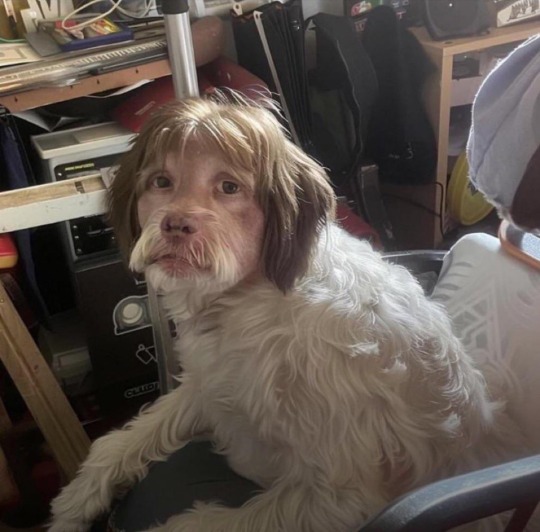
I have to stress that my apartment wants me gone. Why you might ask? Because I’m one of the few tenants in the entire apartment complex that pays $1300 for rent meanwhile everyone else pays $1800-$1900. They want me out to the extent they don’t accept any late fees from me, but accepts from other residents. I asked the apartment manager why, she couldn’t give me answer. It’s the norm to have until the 5th of the month to pay rent but not for me.
Goal: $775
CA: $HushEmu
I have to stress I’m not lazy or useless. I had a job despite having multiple disabilities. I’m not asking for a cookie or a pat on the back but its not easy. One small inconvenience really can set you up to be on the streets. Especially if you’re not privileged to have a good paying job with benefits. Like INSURANCE. Or parents that give a crap about you.
In my case the catalyst for this was simply my glasses breaking that snowballed me to eviction. I am legally blind and I have to thank diabetes for that. I cannot see without my glasses so it would be quite literally deadly for me to be on the roads. Ultimately I lost my job from “job abandonment”
I am asking for community support to stay housed. While I make this unfortunate transition. All I have is this community. There are ways beyond financial support that can help me. $1-$2 makes a significant impact
You can:
• Post on my behalf on all your platforms
• Urge your moots with large followings to reblog/retweet my posts
• You can interact fully with my posts to add traction
With the state of the world as it is right now. We need less apathy and more empathy. Please don’t ignore.

#accounting#aesthetic#alternative#black and white#codeblr#clouds#dark academia#bungou stray dogs#design#culture#drawing#gofundme#donate#dragon ball z#economy#the rookie#fantasy#home & lifestyle#misha collins#pokemon#Spotify
2K notes
·
View notes